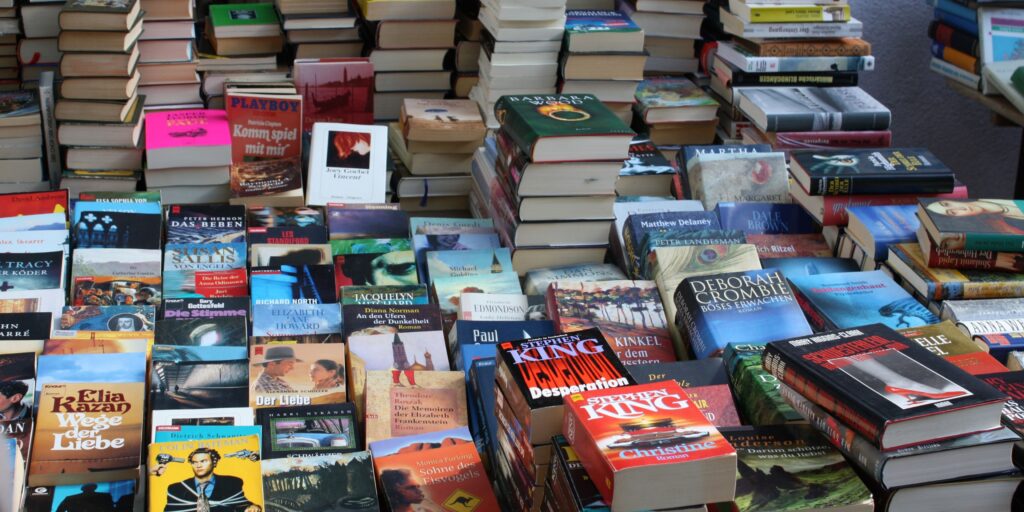
Do you have a novel in you?
Maddy Fry goes behind the scenes of creative writing groups and finds a world where aspiration and tension sit side-by-side.
Like an insufferable number of journalists, I’ve been working on a novel. I can cheerfully say I’ve completed it, but my bragging rights end there.
To many of my less bookish friends, trying to get a novel published can seem like a bewildering exercise in self-flagellation, not least because the constant cycle of editing, reviewing and submitting to agents is a bruising process. Part of me wishes I had never left my happy writer’s cocoon where I had been free to revel privately in my own brilliance, whether real or imagined.

Such an experience perhaps explains the popularity of creative writing groups. Writing tends to be a solitary process, so the chance to give and receive encouragement and feedback, and to lament the endless stream of rejection emails, is often a welcome one. I certainly found that to be the case when I joined a group run by the literary agent Curtis Brown titled ‘Edit and Pitch Your Novel’.
Yet creative writing groups serve a whole range of purposes – particularly as not everyone seeks to make their hobby a career.
Colette Lewis, a management consultant based in London, joined the online meetup group A Write and a Pint during the first wave of Covid-19, saying that it ‘provided a freedom from the boredom of lockdown and a chance to flex my dormant creative muscles’.
Although she didn’t stick with it once restrictions eased, she found the format had lasting benefits. Most of all, it was a space to make mistakes, free from pressure.
“I didn’t expect the writing to be in such short bursts, but found it very effective at quashing perfectionism and encouraging new ideas. Everyone was very supportive and encouraging, especially if you read your work out.”
For some more specialised groups, creative writing offers a chance for people to embrace a completely new phase of life.
Marcia Humphries coordinates writing meetups for the University of the Third Age (known as U3A), an unconventional approach to higher education which allows people in middle age or older to trade their skills and experiences for something new.
“People join because they’ve written reports etc all their working lives and now want to write more freely. Then there are people who want to write memoirs for grandchildren. Some have always written and want to continue,” she says.
She admits it can be a challenge to get people to “give frank feedback on the writing of others. It’s always something you have to work on.” Yet she pointed to some notable successes.
“We run an in-house short story competition annually. Last year’s winner has landed a contract to write stories for a national magazine.”
There’s no doubt that the U3A groups tend to have the same demographic bias as many other creative writing circles. Marcia was candid about this, stressing before answering my questions that “most of our members are 70+, white middle-class retirees. Also, women tend to live longer than men!”
At the other end of the age spectrum, Eleanor Kowol, an employee at Oxford Brookes University who has self-published several novels, found that the city’s writers’ circle was a great way to meet like-minded people while improving her craft.

“I joined because I wanted to get critiques of my work, but it also makes me feel better about where I am as a writer. We all bemoan together how hard it is to do a second draft, and to find time to write. There’s also lots of helpful advice on getting published and/or getting an agent. It also feels really good to get praise for your work from people who know what they’re talking about (not just your loved ones).”
Although the group is mostly made up of those who define as LGBTQI+, if people of colour ever join then Eleanor admits that “they don’t tend to come back much after a few sessions. This is Oxford so the white and middle class element is pretty self-selecting.”
The creative writing groups I’ve been part of have had the same issue, even when they were online and international. Many also cost money, with the Curtis Brown ones priced between £125 and £2800 per course. It reflects a wider criticism of the creative industries, one becoming so intense that a book has recently been penned entitled Culture is Bad for You.
Thankfully the authors don’t seem to advocate abandoning the arts altogether. Yet one of the contributors, academic Orian Brook, describes how the creative industries make people feel excluded if they can’t ‘speak the language’ of those who are more comfortable in those spaces – in other words, those who have had middle class upbringings. She claims far more needs to be done around mentoring and outreach to bring people from non-white and working class backgrounds into those worlds.
But is she right to blame the industries themselves? The much-loved working class playwright James Graham thinks that government and schools have just as much of a role to play in preventing creative spaces from becoming too exclusive.
In a recent interview he called for a re-think around how we view education. This was after news broke in the United Kingdom that government pressure and falling application rates has meant more and more universities are axing or slimming down their English literature, drama and writing courses.

“The problem starts way earlier,” he says, “in primary and secondary schools where the disappearance of drama and music and art has been happening for five to seven years now. We’ve lost about 20% of our teaching time for arts subjects, so of course when you’re at school and you’re being told that there is less value or opportunity to do an arts or social science degree, you’re not going to apply for them [at university], even though there’s great value in doing those courses.”
He added that if current trends continue, ‘it’ll have a significant impact on our cultural landscape going forward’.
There’s no doubt that a complex fusion of factors makes some people feel excluded from a past-time like creative writing, whether inside or outside of university.
But surely closing down access to the arts is a negative solution.
The popularity of initiatives like U3A highlights how important it is for people who were discouraged earlier in their lives to come back to writing, and writing groups in general clearly appeal to people who saw the arts as a closed shop at school and university. Others have responded by creating spaces just for black, working class or LGBTQIA+ writers to showcase and network. They include REWRITE, Out on the Page and the Black Writers Collective.
English PEN have echoed this by setting up an outreach programme called Readers and Writers that aims to introduce children from tough backgrounds, refugees and those who have been in prison to expand their horizons by engaging with creative writing, reading and free speech.
Similarly, the organisation Fighting Words, started by the Irish novelist Roddy Doyle, aims to run writing workshops which bring together disadvantaged children from across the sectarian divide in Belfast.
There are even groups available for those who want to match their writing interests with their faith community. Some have a distinctly global outlook, such as the Catholic Writers Guild, which is based in the US but has members as far as the UK, Mexico, Trinidad and Hong Kong. The Young Muslim Writers Award is more UK-based, running competitions and workshops designed to improve rates of child literacy and encourage children to be ‘confident communicators’.
Yet the trend for setting up groups which are open only to certain people can provoke strong reactions. James Graham criticised a recent attempt to set up a writing group aimed explicitly at ‘the neglected voices of white, working class writers’, calling it ‘insulting, unhelpful and wrong’.
The company Masterclass certainly recommends that people take the bold step of starting their own group if they can’t find one that meets their needs: “Build your own community, pick a day, find a location, and start realizing the benefits of being a part of a writing group.” Yet if a group is too narrow in its scope, it begs the question of how much it’s making creative writing less exclusive.
And what about those who want to go professional? There’s no denying that publishing is competitive, whatever your background.
Are creative writing groups just feeding unrealistic aspirations when the industry seems keen to keep people out rather than get people in?
Can you teach someone to write, and if not, should everyone be allowed to join these groups?
And is there too much pressure since the era of Covid for everyone to have a side hustle? Should we try and monetise every hobby?
Other members of the Curtis Brown course I attended several years ago didn’t share my concerns.
Yvonne Garber, one of my course mates, was inspired to join as her writing was “definitely improving with each new novel, but I wanted it to be as good as it could be and needed some more qualified advice from experts in the field. I knew there was far more to learn, and probably always will be.”
She admitted to being surprised at how hard it has been to get published, but added: “This doesn’t mean there’s something wrong with your book, but more that it’s not right for that moment in time, or not the right fit for that particular agent. We shouldn’t think it’s never going to be right. I guess the bottom line is to keep going!”
The pressure to monetise a passion isn’t a concern for most authors, she said, as “it’s almost impossible to make a lot of money from writing. People write because they love it.”

Another member of our cohort, Sandra Margolese, mentioned having a post-it note above her desk bearing course founder Anna Davis’ comment about how ‘great novels are made in the rewrite’. She added that the Curtis Brown course and other groups had given her ‘valuable writing and life lessons along my writing journey, and each revision and draft leads me closer to my dreams of publication’.
“The world needs stories now more than ever,” she said.
Davis herself described her mission as “finding talented writers who are not yet at the point where they are ready to be taken on by my colleagues or other agents in the industry. We get them and we give them lessons in our boardroom, getting our authors in to talk to them, and we work very hard with them to make their novels as good as possible.”
The course has produced success stories like bestselling author Jessie Burton, who, in Davis’ words, came as an “unemployed actress doing some temping and writing lots of purple prose. Yet she had amazing talent, and she came on the course soaking in everything we talked to her about.”
Her work at the Curtis Brown school turned into the novel The Miniaturist, which went on to sell over a million copies.
The message seems to be that people still love writing, despite the pressures and challenges. Yet worryingly, current trends in education seem to be focused on discouraging people from taking it up, unless they can become the next J.K. Rowling. Most won’t, but this shouldn’t matter. Creative writing can lay the foundations of a life-long passion, and give people a space to find their voice, away from the pressures of modern life.
It should be open to the many, not the few. And thankfully many groups are working to ensure just that.
Like what you’ve read? Consider supporting the work of Adamah by making a donation and help us keep exploring life’s big (and not so big) issues!
Maddy Fry
Maddy Fry is a writer for Adamah Media. She is a journalist who has written for the Daily Telegraph, the New Statesman, the Huffington Post and the Church Times, and appeared on Sky News, the BBC and Radio France International. She also co-runs ScriptWright, a script reading and consultancy service for aspiring screenwriters and playwrights. Outside of this she enjoys Star Wars, drinking stout and attempting to get her first novel published.

